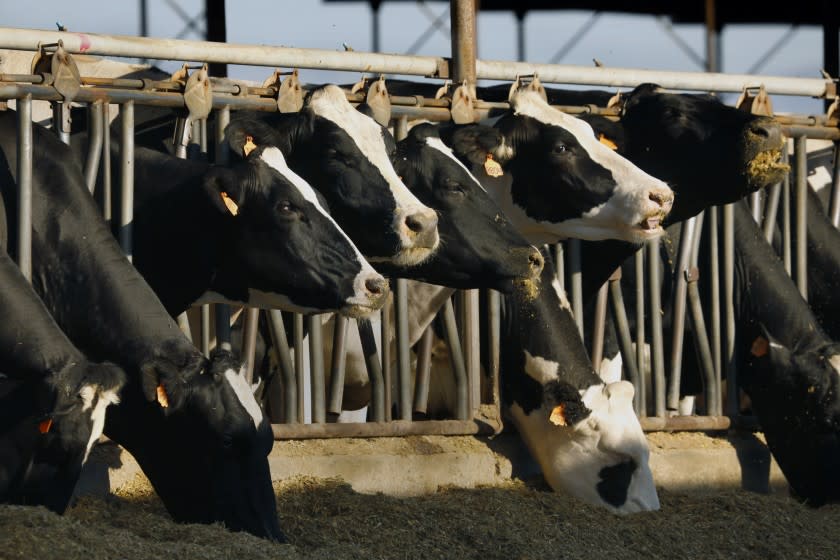Op-Ed: Why meat and dairy corporations are the Achilles' heel of Biden's climate plan

- Oops!Something went wrong.Please try again later.
President Biden cannot deliver on his climate pledges if his administration keeps allowing meat and dairy corporations to emit vast amounts of planet-warming pollutants unchecked.
Greening the energy, transportation, manufacturing and housing sectors — the focuses of Biden’s American Jobs Plan — is not enough to prevent devastating temperature rise. Even if fossil fuel use ended overnight, global emissions related to food production alone are on track to make it impossible to meet the Paris climate agreement’s target of limiting warming to 1.5 degrees Celsius (2.7 degrees Fahrenheit) above preindustrial levels.
The world’s top five meat and dairy companies combined are emitting more greenhouse gases per year than ExxonMobil. If meat and dairy production continues to ramp up as expected, experts predict that the livestock sector could eat up almost half of the planet’s greenhouse gas budget allowable under the 1.5-degree target by 2030. In the United States, nearly 80% of agriculture emissions are related to the production of animals and animal feed.
These emissions are particularly important because farm animals and their manure, along with the oil and gas industries, are our country’s leading sources of methane, a super-pollutant that is shorter-lived than carbon dioxide but far more powerful. Rapidly reducing methane is the strongest action available to slow global warming and limit its consequences in the near term, according to a major recent report by the United Nations.
It would be foolish to depend on the voluntary efforts of the giant meat and dairy conglomerates to fix this. Big Livestock has spent enormous sums lobbying against climate policies and funding initiatives that downplay the climate harms of industrial animal agriculture.
But there is no denying the science. JBS, Tyson Foods, Cargill and their competitors are climate super-polluters. The government needs to start treating them like it.
Regulating air pollution from factory farms is glaringly absent from Biden’s climate plan. The policies to address livestock emissions that Biden has voiced support for so far are predominantly industry-promoted subsidies guaranteed to increase corporate profits, but not guaranteed to make significant climate progress.
For example, Secretary of Agriculture Tom Vilsack — who made nearly $1 million a year as a dairy industry lobbyist before joining Biden’s Cabinet — has promoted using public dollars to subsidize the deployment of biogas technologies that capture methane from factory farm manure lagoons and convert it into energy.
Environmental justice groups oppose this approach as a false solution. Factory farm biogas is not clean energy. Burning it releases carbon dioxide and other contaminants. And the methane-capture technologies do not address the majority of industrial livestock farming emissions, which come from the soils used for grazing and growing animal feed crops, and from the digestive process of cows and other ruminants.
These methane-capture technologies are so expensive they generally only make economic sense for the largest animal-confinement facilities. Providing subsidies could end up increasing emissions by underwriting, entrenching and incentivizing the largest and worst types of animal farms.
Another solution the industry promotes: government incentives for the development of feed additives and genetically engineered livestock. The idea behind it is that the faster an animal grows and the more efficiently the animal converts feed into meat, the fewer greenhouse gases are emitted per animal. These technologies could help reduce emissions intensity, but their potential to mitigate total livestock methane emissions is quite limited, according to the U.N. report.
For example, studies show that feeding cows seaweed can dramatically reduce the methane in their burps. But even if these findings hold up perfectly at scale and are rapidly deployed nationwide where practical, we would still be left with the vast majority of cow-related greenhouse gas emissions.
Increasing efficiency by intensifying production could also cause terrible suffering. The poultry industry boasts that it takes 39% less fossil fuel to produce a chicken today than it did 60 years ago. But this has come at a dreadful cost to hundreds of billions of birds over the past several decades.
These “climate friendly” chickens grow so fast that they routinely suffer excruciating joint pain, collapsed legs, skin burns from being unable to lift themselves from waste-strewn litter, and difficulty breathing. Animal cruelty is not what Americans imagine or want “climate friendly” food to be, but it’s what Big Meat and Big Dairy are serving.
The Biden administration must do better than using public dollars to subsidize corporate greenwashing. To rein in meat and dairy’s climate impact, we need emissions regulation with teeth.
The president should start by directing the Environmental Protection Agency to regulate large factory farms as sources of greenhouse gases and other air pollutants under the Clean Air Act. The EPA sets national standards for air pollutants emitted by coal-fired power plants, oil refineries, chemical factories and other industrial sources.
But the agency has failed to use its authority to regulate many of the exact same pollutants when they’re emitted from factory farms. No federal regulations exist to govern factory farms’ greenhouse gas emissions, despite mountains of evidence that these noxious gases endanger public health and the planet.
Biden does not need Congress’ help to fix this gaping hole in our greenhouse gas regulations. The EPA already has the authority to get the job done. Twenty-five nonprofit and citizen groups recently filed a petition asking the EPA to regulate emissions from industrial hog and dairy operations under the Clean Air Act. The agency should immediately act on their petition.
If Biden can stand up to Big Fossil Fuel, he can stand up to Big Livestock too. And he must: It is impossible to save the planet if our government keeps giving meat and dairy corporations a free pass.
Viveca Morris is executive director of the Law, Ethics and Animals Program at Yale Law School.
This story originally appeared in Los Angeles Times.

